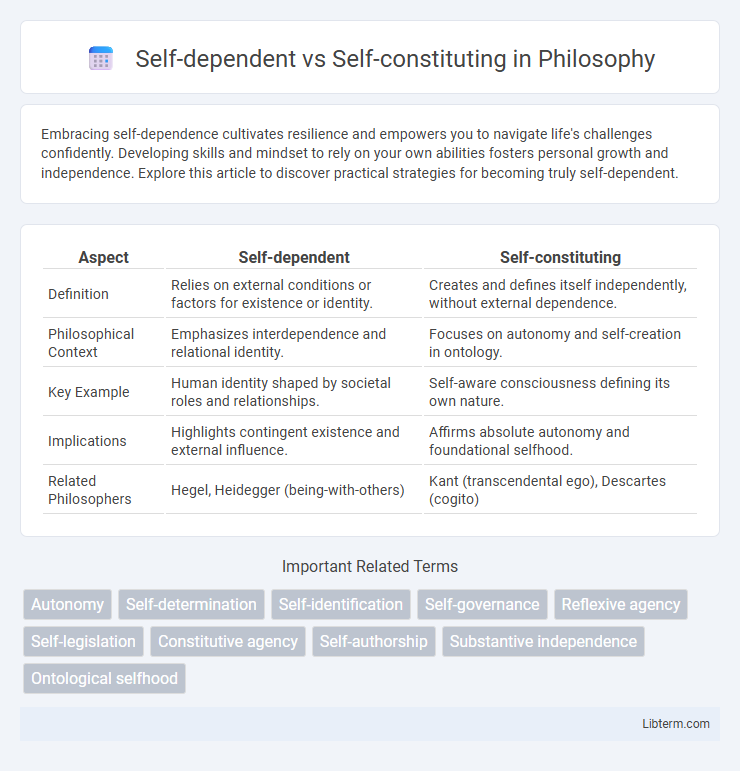Embracing self-dependence cultivates resilience and empowers you to navigate life's challenges confidently. Developing skills and mindset to rely on your own abilities fosters personal growth and independence. Explore this article to discover practical strategies for becoming truly self-dependent.
Table of Comparison
| Aspect | Self-dependent | Self-constituting |
|---|---|---|
| Definition | Relies on external conditions or factors for existence or identity. | Creates and defines itself independently, without external dependence. |
| Philosophical Context | Emphasizes interdependence and relational identity. | Focuses on autonomy and self-creation in ontology. |
| Key Example | Human identity shaped by societal roles and relationships. | Self-aware consciousness defining its own nature. |
| Implications | Highlights contingent existence and external influence. | Affirms absolute autonomy and foundational selfhood. |
| Related Philosophers | Hegel, Heidegger (being-with-others) | Kant (transcendental ego), Descartes (cogito) |
Understanding Self-Dependent and Self-Constituting: Key Definitions
Self-dependent refers to entities or concepts that rely on external factors or conditions for their existence or meaning, while self-constituting describes entities that independently define and sustain their own existence without external influence. Understanding the distinction between self-dependent and self-constituting is crucial in philosophy and ontology, where self-constituting entities possess intrinsic properties that grant them autonomous status. Key definitions emphasize that self-dependent entities are contingent upon others, whereas self-constituting entities are foundational and self-originating.
Historical Perspectives on Selfhood
Historical perspectives on selfhood reveal contrasting views between self-dependent and self-constituting concepts. The self-dependent model, rooted in early philosophical traditions like Aristotle's, posits the self as shaped by external factors such as society and nature. In contrast, Enlightenment thinkers like Kant emphasized the self-constituting nature of identity, arguing that individuals actively generate their own sense of self through reason and autonomy.
Core Principles of Self-Dependence
Self-dependence centers on core principles such as autonomy, personal responsibility, and intrinsic motivation, emphasizing an individual's capability to manage their own needs and decisions without reliance on external factors. It contrasts with self-constituting, which involves the process of forming one's identity or essence based on internal and external influences. Understanding self-dependence is crucial for fostering resilience, accountability, and proactive problem-solving in both personal development and organizational contexts.
Foundations of Self-Constitution
Self-dependent theories emphasize the necessity of pre-existing mental states or experiences as the foundation for self-consciousness, asserting that the self depends on these antecedent conditions. Self-constituting frameworks argue that the self actively generates its own identity through reflexive acts of self-awareness, making self-consciousness a foundational activity rather than a derived state. The foundations of self-constitution explore how self-awareness and intentionality interplay to produce a coherent sense of self without reliance on external mental components.
Philosophical Distinctions: Comparing Self-Dependence and Self-Constitution
Self-dependent entities rely on external conditions or relations for their existence, emphasizing relational ontologies where identity is contingent upon other factors. In contrast, self-constituting entities generate their own essence or identity independently, embodying autonomy and foundational existence in philosophical discourse. This distinction highlights varied perspectives on being, with self-dependence underscoring interdependence and self-constitution asserting inherent self-sufficiency.
The Role of Autonomy in Personal Development
Self-dependent individuals rely on their own resources and decision-making abilities to navigate challenges, emphasizing personal accountability and resilience. Self-constituting persons continuously shape their identity through autonomous choices, integrating experiences to form a coherent self-concept. Autonomy plays a crucial role in personal development by fostering self-direction and enabling individuals to construct meaningful life narratives that reflect their values and goals.
Identity Formation: Self-Dependent versus Self-Constituting Approaches
Self-dependent identity formation relies on external influences and social contexts to shape the self, emphasizing the role of relationships and environmental factors in defining personal identity. In contrast, self-constituting approaches argue that identity is actively constructed from within, where individuals generate meaning and authenticity through internal processes and self-reflection. The distinction highlights differing theories in psychology and philosophy regarding whether identity is primarily shaped by external dependencies or autonomously created by the self.
Practical Implications: Everyday Life and Decision-Making
Self-dependent individuals rely on their internal resources and capabilities to make decisions, fostering resilience and autonomy in everyday life. Self-constituting entails actively shaping one's identity and values through choices, emphasizing personal growth and authenticity in decision-making. Understanding this distinction helps individuals cultivate meaningful goals and navigate life challenges with greater intentionality.
Self-Growth: Balancing Dependence and Constitution
Self-growth involves navigating the balance between being self-dependent, where personal resilience and autonomy drive progress, and self-constituting, where one's identity and values are continuously shaped by experiences and reflections. Emphasizing self-dependence fosters confidence and decision-making skills critical for overcoming challenges, while self-constitution nurtures adaptability and a deeper understanding of the evolving self. Effective self-growth integrates these dimensions to cultivate a harmonious development of independence and self-awareness.
Future Directions in Selfhood Research
Future directions in selfhood research emphasize distinguishing between self-dependent processes, which rely on existing cognitive structures, and self-constituting mechanisms that actively generate personal identity. Advances in neuroimaging and computational modeling are expected to clarify how dynamic interactions between brain networks contribute to the emergence of self-constituting states. Integrating cross-disciplinary approaches from developmental psychology, philosophy, and artificial intelligence will enhance our understanding of the self as both a product and an originator of conscious experience.
Self-dependent Infographic

 libterm.com
libterm.com